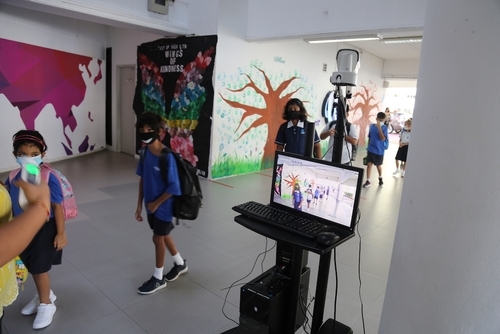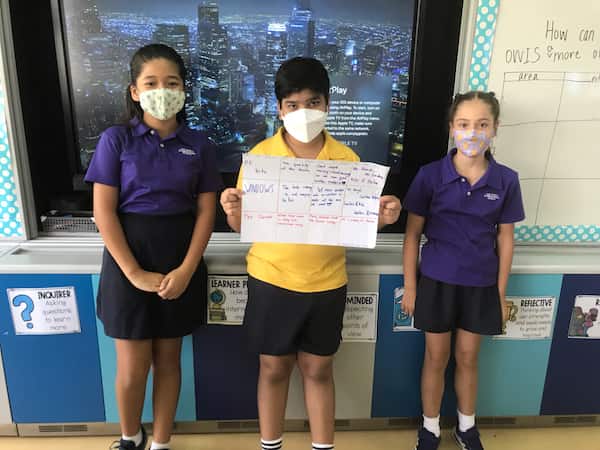Since early 2020, the Covid-19 pandemic and subsequent health crises have drastically affected industries around the world. The education sector has also undergone significant changes. These days, online learning has become the new norm for many school-aged children around the world. While online learning can be a challenge for students, especially younger children, it also opens up new possibilities for students and has its share of benefits and drawbacks.
Fortunately, schools can help their students navigate the disruptions to their activities and the ongoing changes around them through regular communication, pastoral support and adoption of new routines.
Learn more about how schools like One World International School implemented active pastoral care during these unprecedented times and resumed almost all school activities once they were approved, as per government regulations.
The Consequences of Online Learning
While online learning is not new and online classes have been offered for older students in higher education for a few years now, the lock-downs in several countries due to Covid forced children of all ages (including early learners) to attend school online from home. This shift leads to both positive and negative consequences for children of all ages and their families.
Some of the possible consequences of online learning:
- Independence – Students have the opportunity to complete project work on their own and undertake many self-driven activities with limited teacher oversight or peer feedback.
- Self-management skills – Children have the opportunity to learn how to manage their time wisely and work more efficiently to complete assignments.
- Flexibility – Students can choose when and how to complete independent assignments and activities.
- Social withdrawal – Children may experience loneliness or anxiety when they don’t have enough daily face-to-face social interactions.
- Screen reliance – Some students may fill their free time with electronic device usage since they have limited opportunities for physical sports, outdoor activities and extracurricular activities in school.
- Loss of belonging – Children may experience a lower sense of belonging because of limited social interaction and daily isolation from their school community.
Fortunately, schools in Singapore utilised online learning for only a few months. Other schools around the world remain physically closed and many have continued with online learning throughout the year. Yet, all schools can find ways of adapting to change in order to achieve positive learning outcomes for their students.
How OWIS Successfully Dealt with Online Learning
OWIS students have successfully navigated the disruptions in their education due to Covid thanks to our exceptional preparation, teachers and staff. Here are the steps we have taken to meet children’s academic, social and emotional needs.
From day one of the pandemic, our teachers have prioritised the well-being of our students. Our teachers modelled responsible citizenship. We reassured and encouraged students to take ownership of their own safety and contribute to community welfare through our example.

Our tech resources and know-how also supported our students’ successful transition to online learning. Children attended two or three live lessons via video each day and completed related independent tasks on our internal communication tools. Here, teachers and parents could monitor learning and offer feedback. As with all of our technology, we continued to emphasise the importance of digital citizenship and responsibility.
Additionally, OWIS has maintained a balanced, engaging curriculum. Teachers continued to ask inquiry-based questions during live video instruction. Children were also invited to sing, dance and play together virtually as teachers guided specific skill development during lessons.
Also, we ensured our students were well-attended to in all ways during online learning. Like teachers do during in-person classes, they performed social check-ins and mindfulness activities every week. Our goal was to promote better health, help children manage anxiety, build emotional resilience, and ensure each child’s well-being even though we were not together physically.
Simply look at the results to see that our efforts have been successful. For example, our teachers noted the drive and resiliency of our students during online learning. In addition to adapting to change quickly, many children successfully completed their activities independently with minimal supervision.
How OWIS Keeps Children Safe in School
Now that we’ve returned to in-person instruction, we enforce safety and hygiene measures. Like other schools in Singapore, we follow the updated regulations as advised by Singapore’s Ministry of Health and the Committee for Private Education (CPE).
In addition to the government-mandated regulations, we implement numerous Covid safety measures and protocols.
Because adapting to change can be confusing and challenging for children and parents, our teachers work hard to create a safe, relaxed and comfortable environment. Teachers model appropriate behaviour and work tirelessly to establish routines and reduce student anxiety. We also consider each child’s individual needs to ensure everyone feels safe and confident about coming into school. Parents are informed about all procedures, too, as we partner together in giving children the best possible learning environment.
How OWIS has Mitigated Covid Disruptions for our Students
Throughout the pandemic, OWIS has sought to minimise the pandemic’s effect on children. We have also worked hard to guide and support families through these unprecedented times.
But as soon as the government allowed it, we reopened the school and returned to the physical classroom. Most of our students were glad to return to school. We’ve also helped children regain a sense of normalcy and belonging with a return to regular school activities.
As described above, we adapt to change in our classrooms and activities based on government regulations and safety measures. In addition to social distancing, we enforce strict hygiene guidelines, small groups and staggered routines. While following precautions, here are several of the ways we continue to mitigate the Covid disruption in education and support children.
1. All classes have resumed, including art, music, language and PE lessons, plus many other pre-Covid activities.
2. Pastoral care supports students’ well-being. As part of this programme, tutors act as mentors and talk to students one-on-one. We encourage daily face-to-face interactions since observation throughout the day allows teachers to identify problems better while they’re more manageable.
3. Children have the freedom to play and engage in different physical and social activities at OWIS. In many countries, children cannot yet participate in such activities in school.
4. Class performances as part of class assemblies have resumed. We video the small group performances, then merge and share the recordings with other grades and parents during future online assemblies. Additionally, the Head of School and Senior coordinators record their messages on video that are shared to different grades virtually as per the EC/Primary/Secondary/Whole school assembly schedule.
5. The annual Early Childhood production at OWIS was performed and recorded in December 2020 and shared online across our community.

6. We held modified school events that promoted continuity and gave children a sense of belonging to an active, multicultural school community.
- International Day – Students participated in a virtual flag parade and enjoyed a food fair on a smaller scale in their classrooms.
- Kindness Week – Children made a Kindness quilt from notes that detailed what kindness means to them. Students also wrote kindness notes to the staff and teachers.
- Dress-up days – Children celebrated Diwali, Halloween and Christmas while following all Covid regulations.
OWIS Prioritises Children and Learning
When schools moved online, both children and schools had to learn and adapt. The most successful schools in Singapore and around the world placed children at the centre of learning. These schools clearly engaged children and demonstrated innovation, flexibility and technology savviness.
At OWIS, whether online or in school, we, too, have engaged our students academically and socially, and we helped them progress in their learning. Most importantly, we have supported children and helped them maintain a balance in their social, emotional and mental well-being.
We invite you to schedule a virtual tour today and learn more about how OWIS continues to mitigate any disruption in education during Covid. Discover how we put students first.
This blog was originally written in collaboration with Jasween Gill, former Admissions and Communications Director, OWIS Nanyang and Suntec.














